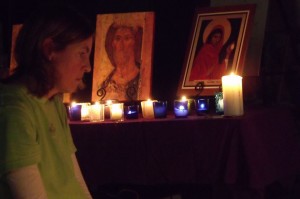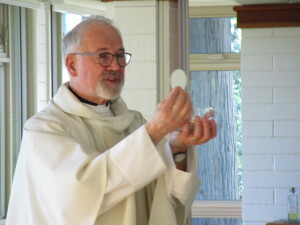Sunday Mass needs some tweaking
There is a battle going on in the Catholic Church between the Pope who wants to inspire Catholics to a deeper experience of God in the Mass of Vatican II and traditionalists who want to hold on to the Latin and pre-Vatican II Mass of the 1950’s, inspired by the Council of Trent (1545-63). I am with Pope Francis. Let’s let go of the old rite and its overemphasis on ritual and the exaggerated role of the priest; let’s embrace the Vatican II rite that is in a language people understand and situates the priest within the community of believers who together pray the Mass. Yes, the priest consecrates the bread and wine into the body and blood of Jesus, but together we celebrate and pray the Mass in Word and Sacrament.
I am sympathetic to a traditionalist’s critique of the Vatican II liturgy: the changes of Vatican II have caused the Mass to lose its sense of mystery, its culture of encounter with the divine. I somewhat agree; but I don’t think a return to the pre-Vatican II Mass is the answer. As I see it, Catholics are hungry for community; and the Sunday Eucharist has evolved to meet that relationship need. Prayer, both personal and communal, can seem to get lost. I get it; intimacy and communion with God is lacking.
What to do? Here’s what I think.
 Quiet, sung prayer before Mass. 10-15 minutes before Mass begins, let worship begin with simple, repetitive sung chants. Chants from Taize in Latin or English would be perfect for this, e.g. Jesus, remember me… Children can be included by teaching them simple hand motions to these chants. Sing the Psalm response for that day’s liturgy; it can help the faith community to learn it and participate more fully during the Mass. (If your parish has a vibrant singing history, use the songs the people know.)
Quiet, sung prayer before Mass. 10-15 minutes before Mass begins, let worship begin with simple, repetitive sung chants. Chants from Taize in Latin or English would be perfect for this, e.g. Jesus, remember me… Children can be included by teaching them simple hand motions to these chants. Sing the Psalm response for that day’s liturgy; it can help the faith community to learn it and participate more fully during the Mass. (If your parish has a vibrant singing history, use the songs the people know.)
Process with the Gospels. The priest ought to begin Mass at his chair, greet the people, and invite all to stand and welcome the Book of the Gospels as it is processed into the church. There is no need for the priest to process into the church like a European monarch with his ministers in tow, the model upon which the current Mass procession is based.
Sunday Mass has too many readings! Three readings and a Psalm response are too much for one person to present in a homily and too much for the people to grasp. Especially when children are present, the presider ought to have the option of dropping the second reading. which often does not relate to the Gospel. Sing the Alleluia both before and after the proclamation of the Gospel to draw the congregation back into full and active engagement.
Focus preaching. Again, as a rule, there are too many readings for the priest or deacon to preach on effectively. The homilist ought to focus on one reading and really work it, sometimes line-by-line, to draw out its meaning for the time it was written and its relevance for us today. 10-12 minutes is all that the homilist needs to give the congregation the one or two points that he wants them to remember. And please, homilist, if there are children and youth present, direct your comments to them. Then let there be a time of silence following the homily.
Preaching teams. Why not identify preaching talent among the lay women and men ofthe parish and bring their wisdom to bear during the Sunday homily? According to the rules of the liturgy, the priest/deacon can invite anyone to help him in his duties to preach the Word of God. (I was part of a preaching team at my former parish in West Seattle.)
 Sing the Creed! In the ebb and flow of the Mass, the reading of the Scriptures followed by the preaching of the homily are the most passive times for the congregation. Reading / reciting the Creed does little to draw the congregation into the Mass. LET’S SING IT! Or let us sing a refrain, with a cantor singing the words of the creed. The most participatory singing at Mass is not usually with the choir hymns, but with the parts of the Mass (Holy, Holy; Lamb of God; Alleluia; Amen, Our Father) that all the people know by heart. Let’s sing the Mass, including the Creed!
Sing the Creed! In the ebb and flow of the Mass, the reading of the Scriptures followed by the preaching of the homily are the most passive times for the congregation. Reading / reciting the Creed does little to draw the congregation into the Mass. LET’S SING IT! Or let us sing a refrain, with a cantor singing the words of the creed. The most participatory singing at Mass is not usually with the choir hymns, but with the parts of the Mass (Holy, Holy; Lamb of God; Alleluia; Amen, Our Father) that all the people know by heart. Let’s sing the Mass, including the Creed!
Find a prayerful way to involve the children. Have them lead a part of the Mass such as the Eucharistic Acclamation or the Lamb of God and include sign language. This is not a performance. Children leading songs with accompanying hand motions can be intensely prayerful.
Quiet prayer after communion. As communion ends, please, don’t miss this time of prayer and intimacy by watching the presider wash the sacred vessels (chalice and paten). Move the washing of vessels to after Mass. The time after communion is an important time when the music minister or priest presider can invite each person to draw close to Jesus who has just given himself to all in the Eucharist. Repeat a simple Taize chant, the Psalm response, or a familiar refrain like “Shepherd me, O God…,” for the next 2-3 minutes. Some parishes sing the Anima Christi (Soul of Christ, sanctify me…).
Closure. This is a good time for announcements, to welcome newcomers, and to remind all that the Lord Jesus is with us right now to help us go forth to be the Good News in the world.
Sunday Mass is the ordinary place where Catholics gather to encounter the risen Jesus present in one another, the proclamation of the Word, and the reception of the Eucharist. Other opportunities need to be developed to assist parishioners to socially connect with one another. Some simple changes can help this happen.

Thoughtful and interesting suggestions.
My own view is that the Mass is a drama, but not a performance.
It needs to inspire (instill the Holy Spirit).
It is at a minimum art. It is at least as important for the heart as for the head – but most important for the soul.
“And you shall love the LORD your God with all your heart, with all your soul, with all your mind, and with all your strength.’ This is the first commandment.”
Great Ideas Robert!